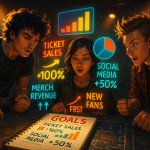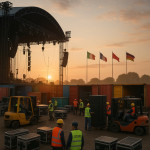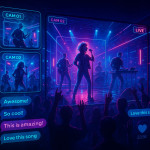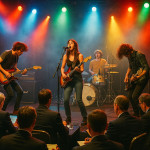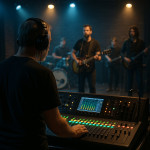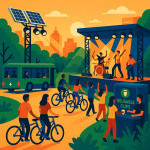Community pop-up gigs: strategies to engage local audiences and attract sponsors
Want to fill a car park, rooftop or library atrium with buzzing fans – and make local brands pay for the privilege? This guide unpacks actionable tactics to plan, promote and monetise community pop-up gigs so that audiences feel involved and sponsors see measurable ROI.
Why community pop-up gigs convert casual listeners into loyal advocates
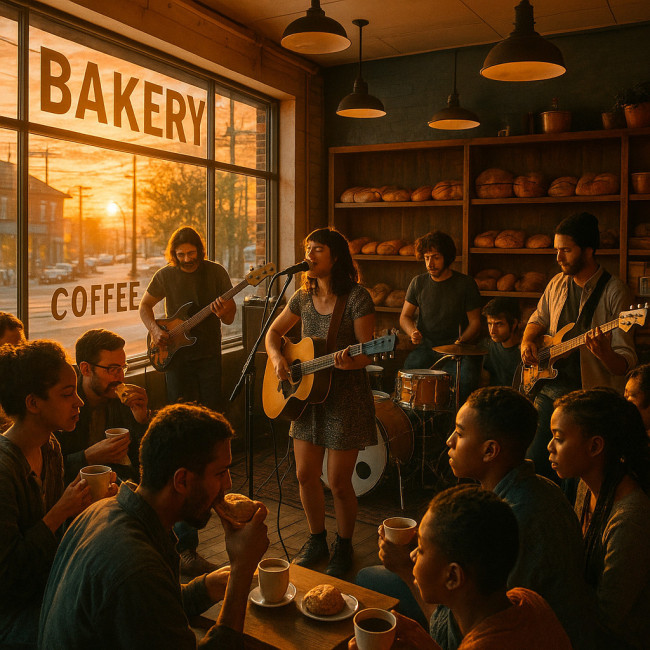
Unlike traditional concerts, a community pop-up gig happens in an unexpected place: a bakery at dawn, a skate park at sunset, a museum foyer during lunch hour. The pleasant surprise creates word-of-mouth, deeper emotional recall and social-media gold. When you add local storytelling – the neighbourhood's history, seasonal festivals or charity ties – your community pop-up gigs become hyper-relevant. Sponsors love relevance because it translates to exposure that feels organic instead of forced.
Benefits at a glance
- Ultra-targeted footfall without hefty venue hire.
- Short planning cycles – you can test concepts in weeks, not months.
- Low production footprint fits CSR goals of eco-minded sponsors.
- Built-in content: behind-the-scenes reels, livestreams and user-generated clips.
Step-by-step blueprint to stage a successful pop-up gig
1. Clarify your core objective
Decide whether you're chasing subscriber growth, fundraising, merch sales or pure brand awareness. Every decision – from set-list length to sponsor tiering – flows from that north star.
2. Scout venues with built-in communities
Think farmers' markets, co-working rooftops, boutique gyms or even ferry terminals. Location managers are often delighted to host cultural moments that boost footfall. When you pitch, reference case studies such as the immersive dining pop-up model, which shows how experiential events translate into revenue and media coverage.
3. Craft a hyper-local narrative
Make the show about the neighbourhood, not just the artist. Examples:
- Highlight a local charity and donate a song's streaming revenue.
- Debut a track that samples historic soundscapes from the district.
- Invite a community choir for a one-night collaboration.
4. Design audience participation hooks
Interactivity drives dwell time. Use tactics such as:
- QR-code song requests that feed a real-time poll.
- Sticker voting walls where guests pick the encore.
- Pop-up photo booths with branded backdrops for instant social sharing.
5. Build a sponsor-ready asset pack
Before outreach, create a folder with:
- Projected attendance and demographic data (street-survey or Instagram Insights).
- Mock-ups of stage layout showing logo placements.
- Media value estimates (impressions, shares, press reach).
- Tiered benefit matrix – bronze, silver, gold – including naming rights.
For inspiration, study the proposal formats outlined in this venue partnership blueprint. Adapt the template to live music.
6. Activate multi-channel promotion in 3 waves
| Wave | Timing | Tactics |
|---|---|---|
| Tease | T-21 to T-14 days | Mysterious posters, geotargeted Stories, email save-the-date. |
| Reveal | T-13 to T-7 days | Artist announcement, sponsor highlight, early-bird RSVP. |
| Engage | T-6 days to event day | User-generated challenges, local media interviews, countdown reels. |
7. Capture metrics that matter to sponsors
Post-event, share a mini-report within 72 hours. Include:
- Unique attendees vs. RSVP list.
- Average dwell time (heat-map apps or manual counts).
- Social reach: tagged posts, hashtag mentions, video views.
- Opt-ins: mailing-list sign-ups, app downloads.
- Earned media: blog articles, local radio spots.
If you filmed highlight reels, package them using tips from this videography reel guide before sending to sponsors.
Sponsor magnetism: what local brands really want
Community pop-up gigs succeed when brand values align with audience passions. Here are typical sponsor profiles and the hooks that convince them.
| Sponsor type | Key KPI | Persuasive hook |
|---|---|---|
| Neighbourhood café chain | Foot traffic within 3 km | In-set product placement (artists drink branded coffee on stage). |
| Eco-conscious fashion label | User-generated content | Up-cycled merch booth + hashtag contest. |
| Local council | Community wellbeing index | Free entry tier plus charity tie-in. |
| Regional craft brewery | Sales lift weekend of event | Exclusive pour rights and limited-edition can art featuring gig graphics. |
Funding stack: diversify revenue beyond sponsorship
Even with sponsor cash, smart organisers weave multiple income streams to derisk budgets.
Ticketing models
- Pay-what-you-can with suggested tiers; sponsor matches donations.
- Time-slot tickets to manage capacity inside small venues.
- VIP micro-experiences: backstage Polaroid session, signed set-list.
Dynamic ticketing mirrors the techniques used by itinerant food events – see this deep dive on dining pop-ups.
Merch that feels site-specific
Print limited posters featuring GPS coordinates and event date. Scarcity boosts perceived value, and hyper-local art becomes a collector's item.
Digital extras
- Sell multitrack stems of the live recording via a gated link.
- Offer NFT photo passes for superfans (bonus autograph line priority).
Local SEO and discovery hacks
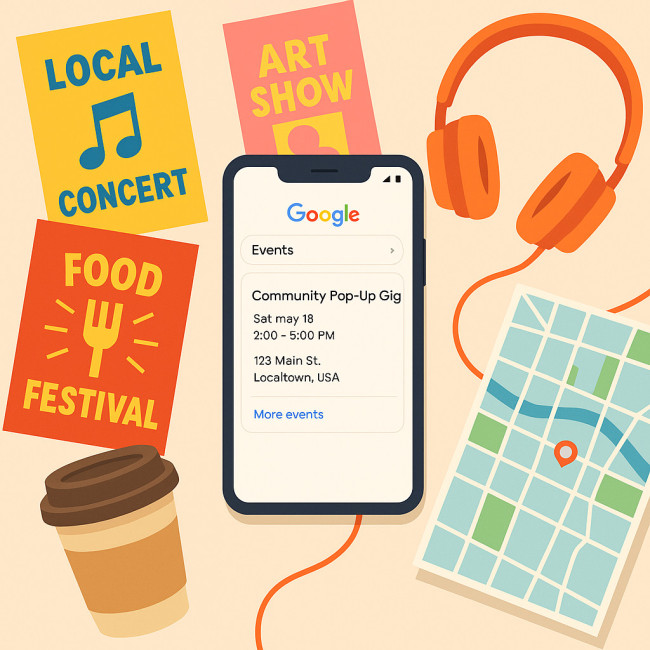
People can't attend what they can't find. Optimise listings on Google Events, Eventbrite, Bandsintown and community Facebook groups. Embed schema markup so search engines surface your community pop-up gigs on “Things to do” carousels. For a broader view on place-based optimisation, review the tactics in this local SEO playbook.
Partnership distribution
Share the event on the event-ready musician roster used by regional promoters. The platform syndicates listings to local press calendars, amplifying reach with minimal effort.
On-site experience: details that spark repeat attendance
Sound & lighting
Keep setup modular: battery-powered speakers, collapsible riser, LED wash lights. Quick rigging decreases disruption in public spaces and impresses venue managers.
Accessibility wins
- Step-free stage visibility zones.
- Live captioning via projected lyrics.
- QR-code programme notes for screen-readers.
Such inclusive design echoes the principles explored in this accessibility guide.
Green footprint
Show sponsors your sustainability commitment: reusable cup schemes, solar-charged battery banks, bike valet. Those efforts align with ESG budgets, mirroring the donor dynamics explained in eco-sponsor success stories.
Mini-quiz: Test your pop-up mastery
FAQ
- How far in advance should I start planning a community pop-up gig?
- For a 200–300-capacity show, four to six weeks is enough if you have venue and equipment partners on speed dial. Larger activations may need three months to secure permits.
- Do I need an event licence for a public-space pop-up?
- Regulations vary. Contact the local council's events team. Many cities offer simplified “temporary activity” permits for performances under 500 people.
- What percentage of my budget should come from sponsors?
- Aim for 40–60 %. Diversify with ticketing, merch and grants so the event remains viable if one sponsor pulls out.
- How many community pop-up gigs per year is sustainable?
- Artists typically run 2–4 to keep scarcity high while maintaining audience excitement. More frequent shows risk fatigue and lower sponsor bids.
- Can virtual elements coexist with live pop-ups?
- Absolutely. Hybrid models stream the headline set or backstage interviews, expanding sponsor impressions and accessibility.
Ready to launch?
When you blend local storytelling, interactive design and sponsor-oriented metrics, community pop-up gigs become more than concerts – they transform into civic experiences brands want to underwrite. Map your first concept today, and watch your inbox fill with partnership requests.
Take action: download our free sponsor deck template and start pitching before prime calendar dates disappear.
